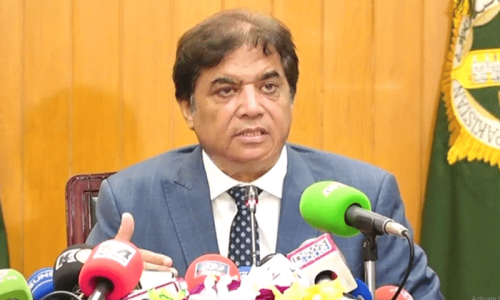• 79,603 prisoners against sanctioned strength of 64,099 in 116 jails, says ombudsman
• Provinces asked to follow Sindh govt example in revising outdated laws, procedures
ISLAMABAD: The federal ombudsman has conceded in a report submitted to the Supreme Court on Wednesday that there are 79,603 inmates in 116 jails of the four provinces against the sanctioned capacity of 64,099 prisoners.
Headed by Chief Justice of Pakistan Gulzar Ahmed, a three-judge SC bench, which was hearing a case pertaining to conditions of the inmates in the country’s overcrowded prisons, had earlier asked the federal ombudsman to formulate recommendations to redress the grievances of inmates, particularly women prisoners.
The report furnished before the apex court on behalf of the federal ombudsman office through senior counsel Hafiz Ahsaan Ahmad Khokhar gave province-wise data of inmates along with the sanctioned capacity of the prisons.
It stated that of the total 79,603 inmates in the four provinces, 48,283 were detained in 43 jails of Punjab against the sanctioned strength of 36,806. Similarly, 17,322 inmates were in 24 jails of Sindh against the capacity of 13,538. Khyber Pakhtunkhwa has 38 prisons with a sanctioned strength of 11,170 and around 11,891 were detained there. Balochistan is the only province where the number of prisoners was less than the sanctioned strength of jails, according to the report. Eleven jails in Balochistan have 2,107 inmates against the sanctioned strength 2,585.
The apex court directed the relevant officials to share the report filed by the ombudsman office with Attorney General Khalid Jawed Khan and the advocates general of all the provinces.
The bench also asked the provincial governments to implement recommendations given in the report.
Outdated laws, procedure
The ombudsman office stated that after receiving reports from the provincial administrations, it felt the need that outdated laws and procedures should be reviewed by the provinces on the pattern of law framed by the Sindh government. Besides, the probation and parole system needed to be made more effective through necessary amendments to laws by the provinces.
The report suggested to the home departments and inspectors general (prisons) to expedite work for provision of basic facilities in jails. In this regard, it stated, special attention should be paid towards supply of clean drinking water to all prisoners and visitors, seating arrangements for visitors, establishment of proper toilets, besides ensuring provision of healthcare facilities by filling vacancies for doctors and paramedical staff.
The home departments were also suggested to work on a comprehensive plan for the provision of basic facilities in judicial lockups/Bakshi Khana.
Biometric verification of prisoners
Similarly, the provincial home departments were asked to complete biometric verification system/common interface for prisoners throughout the chain from jails to courts with all the departments concerned i.e. police, prisons, prosecution and Nadra included. The home departments should also expedite the process of automation of prisoners’ record, the report added.
The ombudsman highlighted the need to segregate hardcore criminals as well as drug addicts from other prisoners, besides ensuring the provision of medicines to drug users and mentally ill prisoners.
The report explained that the federal ombudsman secretariat has been making strenuous efforts for the implementation of recommendations by the prison reforms committee.
The home and prisons departments were asked to coordinate with educational institutions in each district for imparting quality education to prisoners in jails for which donors/educational institutions be encouraged to play their respective role effectively and efficiently.
Published in Dawn, November 12th, 2020















































